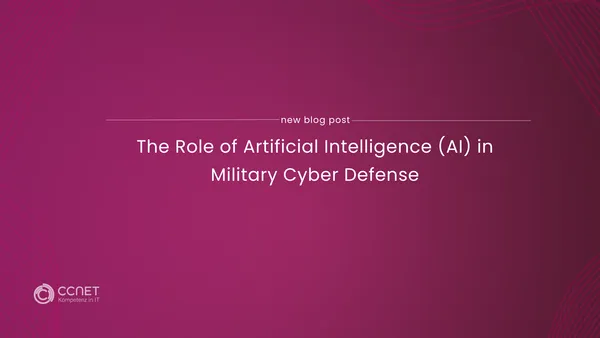
CCNet
Feb 26, 2025 • 2 min read

The Role of Artificial Intelligence (AI) in Military Cyber Defense
The digital threat landscape is evolving rapidly. Cyberattacks are not only becoming more frequent but also more sophisticated. In this environment, Artificial Intelligence (AI) provides an effective means to analyze large datasets in real-time, helping to identify threats and initiate corresponding countermeasures. Military cyber defense units leverage AI to detect patterns that may indicate an impending threat and to spot anomalies in networks that could signal an ongoing attack.
AI enables the automatic detection of known attack patterns and allows systems to dynamically respond to new threats. Through machine learning, AI systems can continuously improve their detection capabilities by learning from new data, which is particularly important since cyber attackers are constantly evolving their tactics.
Applications of AI in Cyber Defense
-
Threat Detection: AI-powered systems can analyze network traffic in real-time and identify unusual patterns that could indicate a cyberattack. This allows for quicker identification and isolation of threats before they can cause harm.
-
Automated Response: One of the biggest challenges in cyber defense is the speed at which threats must be addressed. In many cases, AI can automatically respond to detected threats, such as isolating affected systems or blocking suspicious activities, without waiting for human intervention.
-
**Enhancing Cyber Resilience: By analyzing historical data, AI can help identify vulnerabilities in networks and implement proactive measures to bolster cyber resilience. This is particularly critical in a military context, where continuous operational functionality is of utmost importance.
-
**Supporting Cyber Exercises: AI can be used to simulate realistic cyberattack scenarios for training purposes. This allows defense forces to test and improve their response strategies under realistic conditions, sharpening their readiness for actual threats.
Challenges of Implementing AI
While AI offers many advantages for military cyber defense, several challenges must be addressed:
-
Complexity and Trust: AI systems are often complex, and their decision-making processes are not always transparent to human operators. This can undermine trust in the systems, especially in high-stakes situations where rapid and precise decision-making is critical.
-
Dependence on Data: The effectiveness of AI heavily depends on the availability and quality of data on which it is trained. In a military setting, data can often be sensitive, incomplete, or hard to access, which can impair the performance of AI systems.
-
Adversarial AI: Another emerging threat is the potential use of AI by attackers, or the manipulation of existing AI systems to bypass defense mechanisms. Adversarial AI techniques require continuous adjustments and improvements to defense systems to stay ahead of these evolving threats.
Future Prospects
The integration of AI into military cyber defense will continue to increase in the coming years. As machine learning and other AI technologies advance, these systems will become more powerful and versatile. AI is expected to play an increasingly central role in securing networks and countering cyber threats.
To fully capitalize on the benefits of AI, military organizations must continue to invest in research and development to refine these technologies and expand their potential applications. At the same time, they must remain mindful of the ethical and security-related challenges associated with using AI in cyber defense.
Conclusion
Artificial Intelligence has the potential to significantly strengthen military cyber defense. By automating detection and response processes, improving resilience, and supporting training efforts, AI can help to combat cyber threats more effectively. However, the challenges associated with AI—such as ensuring transparency and managing dependencies—must be carefully addressed. The continued integration of AI into military cyber defense will be essential for maintaining a competitive edge in the face of increasingly sophisticated cyber adversaries.


